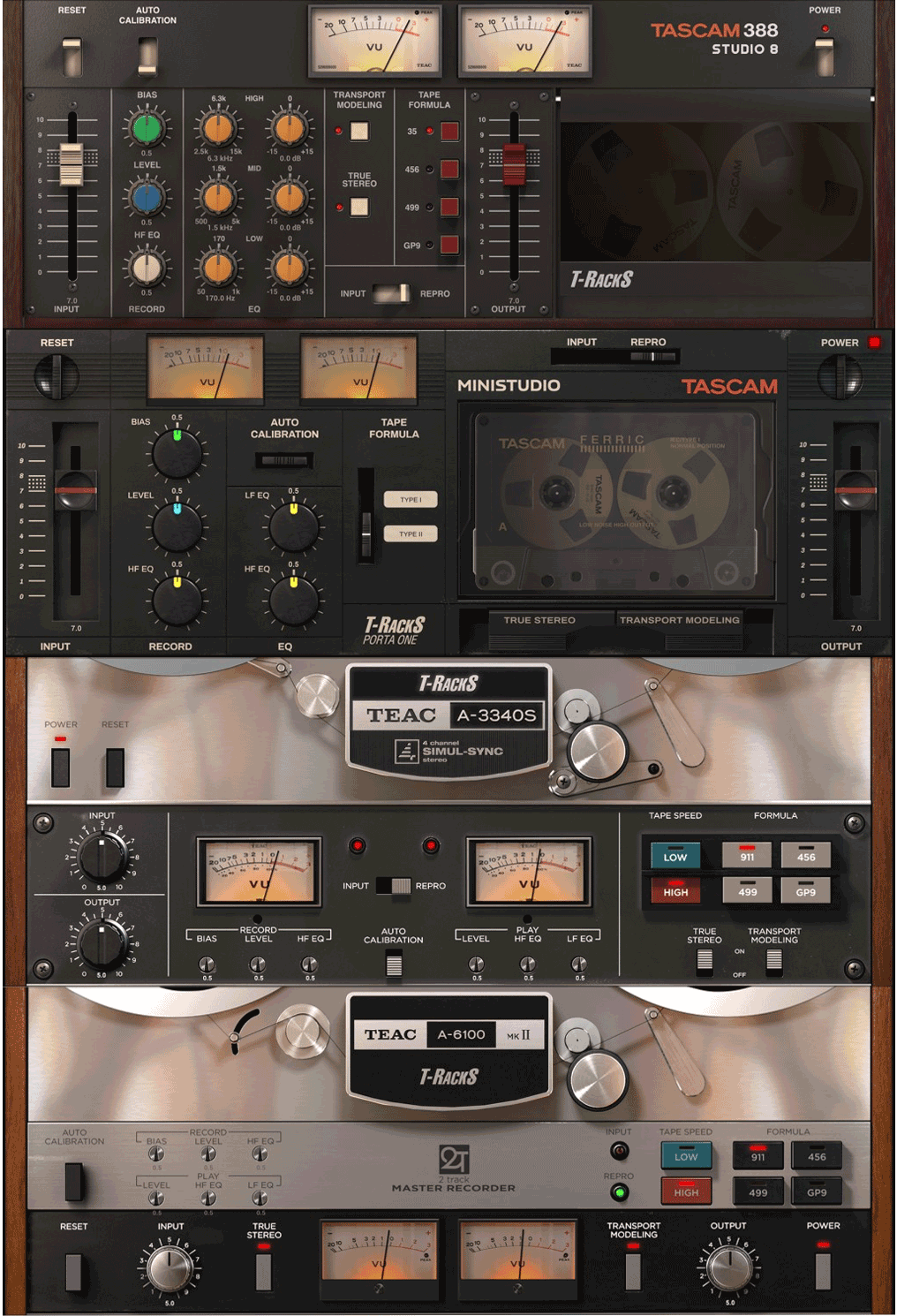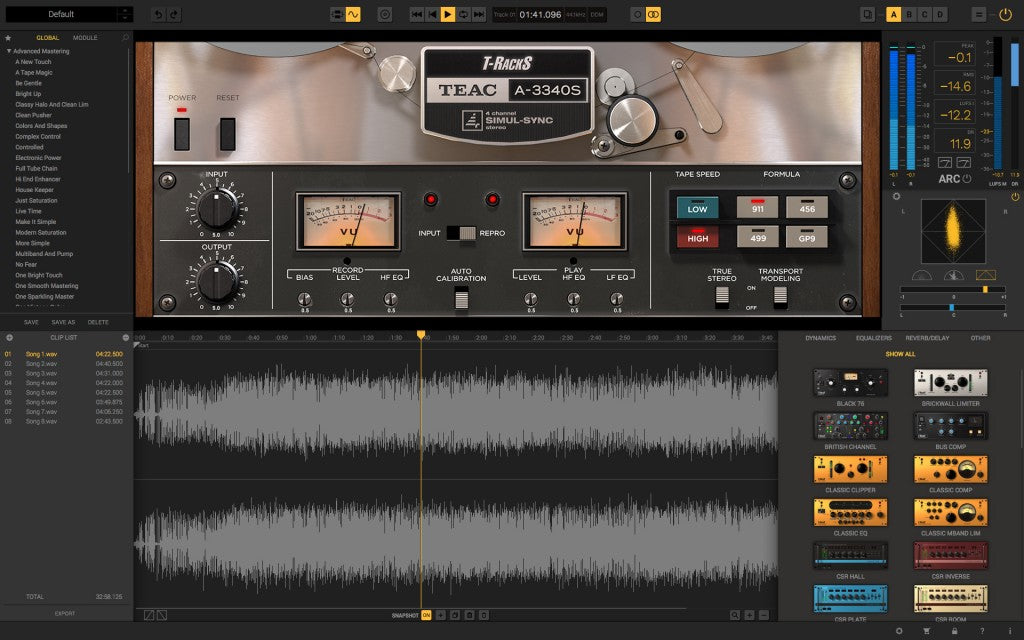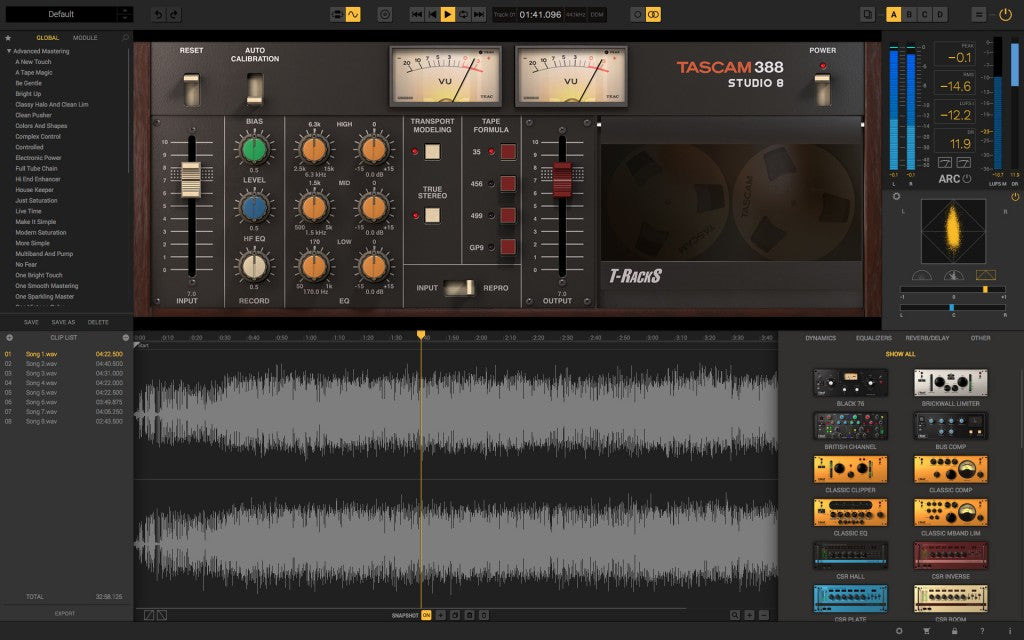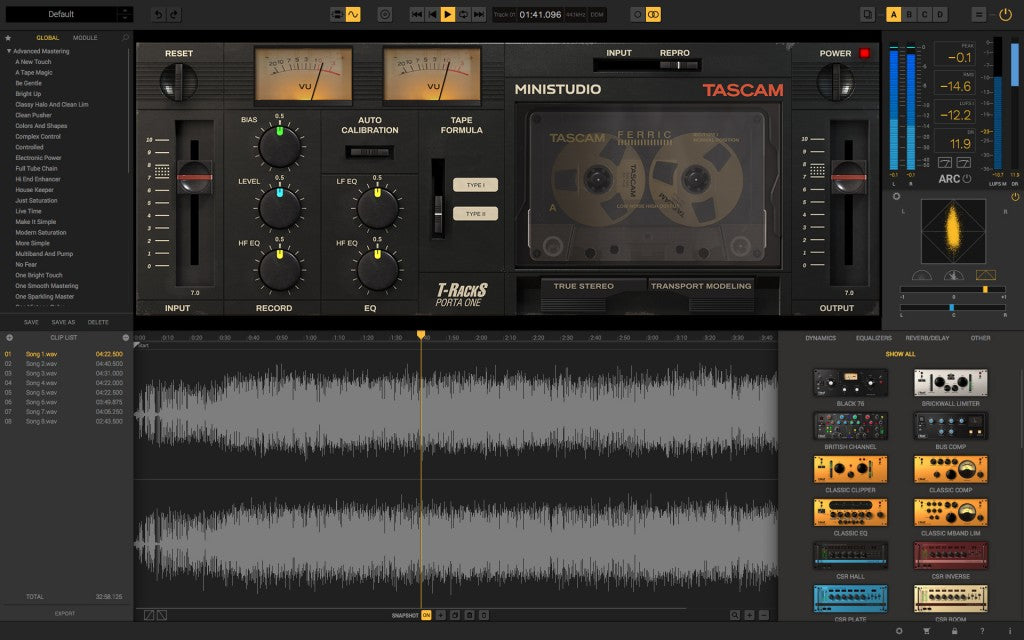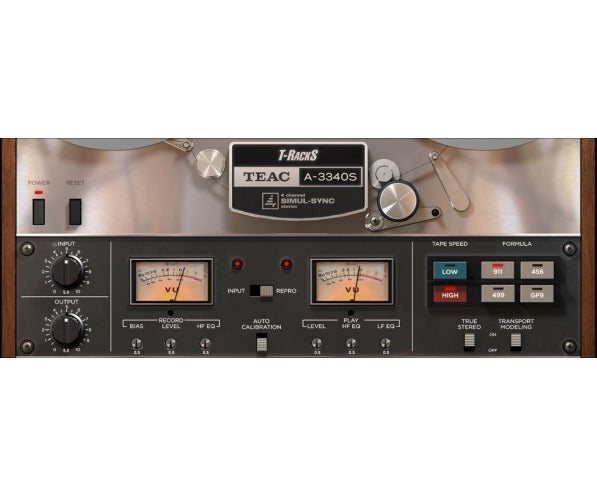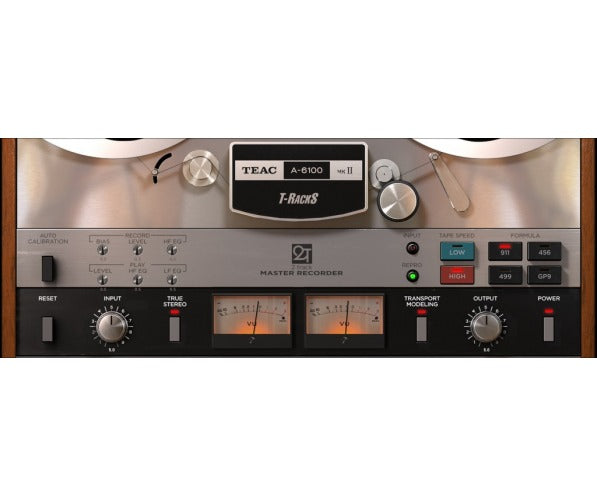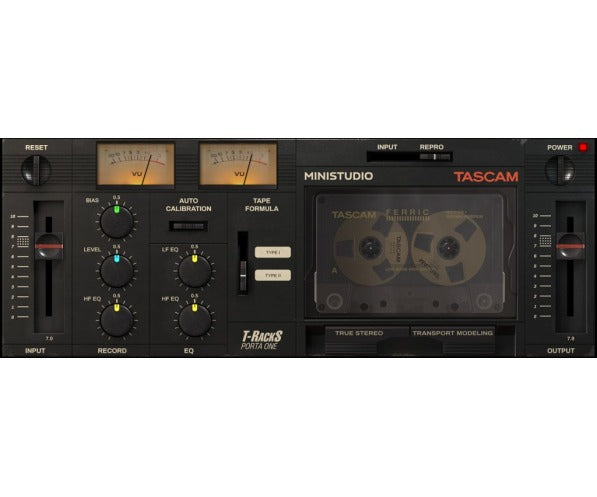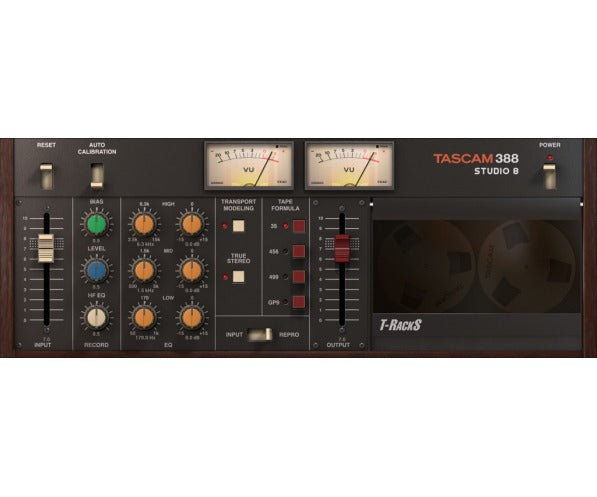Description
Re-creating the magic
Analog tape audio recorders are complex systems. They impart magic to the audio material, lifting the art within to a higher level. They add musicality to music.
What a tape machine adds to audio is the result of a number of interactions amongst several interdependent factors. More than just saturation, compression, or EQ alone, these factors work together, one affecting each other with the dynamics of music, adding a “movement” that goes into the soul of what we perceive.
Decades of music produced on these pieces of artful human engineering have tailored the way we think music should sound. It’s imprinted in our DNA.
From TASCAM DNA to IK DSP
For the T-RackS TASCAM Tape collection, each machine was chosen specifically by TASCAM and TEAC themselves, recommending particularly sought-after models from their history and helping IK source the best-sounding units. Each machine then went through a complete restoration to bring them perfectly back “to spec” before the scientific modelling process started.
IK’s DSP engineering team then took each stage apart, analyzed them in-depth, and produced a model of the entire magnetic tape-recording process. This model works in symbiosis with a powerful dynamic convolution engine to capture the essence of the real machines, faithfully bringing the complete picture of these complex analog engineering marvels to the digital realm.
The program coming out of these units is very similar to the one coming in, just better. It's subtle, but the impact is anything but.
And the T-RackS TASCAM Tape collection faithfully brings all this magic right to your DAW.
Pro-level recording for everyone
Fresh from our experience creating the original T-RackS Tape Machine Collection, we're bringing that modeling technology back home where so many of the songs we love were conceived and first put to tape. Join us as we celebrate TASCAM's 50th anniversary with the T-RackS TASCAM Tape Collection.
When it comes to the development of home-recording, no other company was more important than TASCAM, empowering countless musicians and songwriters to do more on their own. Now you can give your tracks that TASCAM warmth and character with officially certified versions of their most sought-after models, all together in the T-RackS TASCAM Tape Collection.
From reel to realistic
Made in collaboration with TASCAM for their 50th anniversary, this collection includes 4 of their most popular and iconic tape machines. Some of these are part of music history. Some still have fan pages all over the web. But all of these are incredibly sounding examples of tape recorders that can add warm textures and colors to your recorded tracks.
TEAC A-6100 MKII
The TEAC A-6100 MKII mastering recorder is still highly sought-after today, thanks to both its robust design and incredible sound. Featuring controls to fine-tune your sound, including record and playback EQ settings, the A-6100 MKII is the one to add tape warmth and color to your master bus and more.
TEAC A-3340S
The TEAC A-3340S is the 4-track tape recorder behind some of the most famous demos and songs in history. For example, The Doobie Brothers used a A-3340S to record several of the song demos that earned them a record deal, while Brian Eno and others still use it today for its sonic qualities.
TASCAM 338
The TASCAM 388 was a huge success, combining a mixing console and tape machine in one to create a real winner. Kelley Stoltz made the 388 famous again around 2001 when he used it to record some hit songs and their sound went viral. Ever since, the 388 has kept its magic status.
TASCAM PORTA ONE
Today, the TASCAM PORTA ONE is used for “lo-fi” sounds, creative experiments and even for live performance. However, when using its "standard" settings, the PORTA ONE's sound is warm and clear, offering the sonic signature that made it so popular then and again today.
The magic formulas
Depending on which TASCAM tape machine you're using, there's a choice of 4 different tape formulations to try, each with its own unique tone. The exception is the TASCAM PORTA ONE, which offers a choice of 2 cassette tape formulations: Type I and Type II.
35: Modelled after the BASF LPR35, this is the formula TASCAM recommends for an optimal balance between warmth and precision on the TASCAM 388.
911: Modelled after the BASF SM911, this is the formula TASCAM recommends for an optimal balance between warmth and precision on the TEAC A-6100 MKII and TEAC A-3340S.
456: Modelled after the Ampex 456 formula, this model went into production around 1974. Perhaps the most widely used tape, it contributed the most to what is considered “the” tape sound. It offers a warm, round tone with a slight touch of saturation that greatly responds to the recording level.
GP9: Modelled after the Quantegy GP9 formula, this tape accepts higher levels of signal with minimal distortion and compression. It’s very punchy and perfect for modern, high quality analog recordings.
499: Modelled after the Ampex 499 formula, this tape is designed to handle a great amount of level with minimal distortion and compression. It also exhibits added high frequency definition that makes it perfect for printing “digital-like” recordings, while still maintaining an analog sound."
Comprehensive Controls
All TASCAM Tape Collection plug-ins share the same set of controls to enhance the ease of use and allow for quick A-B comparisons among them. Key features include:
Signal path selection: With “Input,” the signal only passes through the input and output electronic stages of the recorders, bypassing the tape. Depending on how the recorder is designed, the “Input” path can sound extremely transparent or just slightly more colored. “Repro” passes your signal through the entire analog recording system: input-> recording amplifier -> recording head -> tape -> playback head -> playback preamplifier -> output stage.
True Stereo: Even a perfectly aligned tape machine will have slight level, EQ and distortion differences between the left and right channels. This is good and part of the analog recording mojo! The T-RackS TASCAM Tape Collection perfectly recreates these subtle differences to deliver the real experience. If perfectly identical left and right channel processing is a must, simply disable this feature.
Tape Speed: Select the speed of the tape transport between 7.5 and 15 inches per second (“ips”). The higher speed gives you more fidelity, and the lower speed delivers a warmer, rounder tone.
Transport Modeling: Precisely models the behavior of the mechanical transport. Small irregularities in the movement of the tape creates various degrees of sonic alteration to the audio program, especially between the two channels. Keep it on for the magic to happen! In case a perfectly steady performance is needed, just disable the control.
Record Bias: Ideal bias voltage settings provide maximum sensitivity and low distortion. Intentionally overbiasing is a common technique to produce a warmer, gently saturated sound. Underbiasing can be used to nicely boost the high frequencies in a truly unique way and add distortion and other nonlinear effects.
The power of T-RackS
Like all T-RackS plug-ins, the TASCAM Tape Collection offers you two ways to work: as a stand-alone plug-in, or inside the T-RackS 5 shell. Use these together with any of the other 39 T-RackS processors to mix and master faster than ever creating a powerful, lightning-fast workflow.
The T-RackS shell offers a unique modular system with up to 16-processor chains, series & parallel routing, easy A/B/C/D comparison, up to 192 kHz / 32-bit floating point processing and much more, in both a plug-in and stand-alone mastering application.
- A bundle of plug-in models based on 4 iconic tape machines: TEAC A-6100 MKII, TEAC A-3340S, TASCAM 388, TASCAM PORTA ONE
- Combines convolution and physical modeling to capture every element of the signal chain
- True stereo operation to simulate the effects of 2-channel tape
- Works as AU, VST 2, VST 3 and AAX plug-in
- Works inside the free T-RackS Shell for stand-alone mastering
System Requirements
T-RackS 5 is a 64-bit application and requires a 64 bit CPU and Operating System.
Mac® (64-bits)
Minimal: Intel® Core™ 2 Duo, 4 GB of RAM (8 GB suggested), macOS 10.10 or later.
Supported Plug-in formats (64-bit): Audio Units, VST 2, VST 3, AAX.
Windows® (64-bits)
Minimal: Intel® Core™ 2 Duo or AMD Athlon™ 64 X2, 4 GB of RAM (8 GB suggested), Windows® 7, Windows® 8 or Windows® 10. Requires an ASIO compatible sound card.
Supported Plug-in formats (64-bit): VST 2, VST 3, AAX.
NOTE: EQual processor requires an OpenGL 2 compatible graphics adapter.
Internet connection is required as all of the Custom Shop operations are web based.

